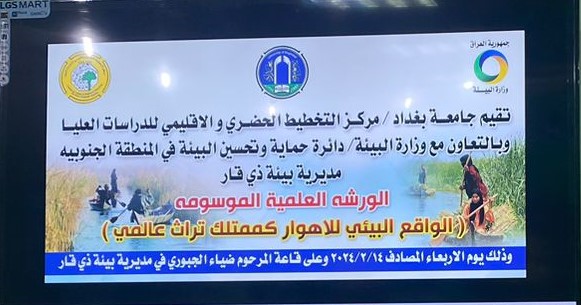The Center of Urban and Regional Planning for Postgraduate Studies at the University of Baghdad participated in a scientific workshop entitled (The Environmental Reality of Marshes as a World Heritage Property) in cooperation with the Department of Environmental Protection and Improvement in the Southern Region of the Ministry of Environment. Professor Dr. Jamal Baqir Mutlaq represented the Center and confirmed in his paper that climate change has affected all countries, and one of the most prominent manifestations of climate change in Iraq is the decline in the levels of the Tigris and Euphrates rivers, the scarcity of the levels of dams and marshes, as well as the lack of rain.
Dr. Mutlak stressed that the results of these changes had a negative impact on the country, as they led on the social level to migrate from the countryside and marshes to the cities, in addition to their economic impact, which contributed to a decline in agricultural production and its repercussions on food security and the overall economy in general, while Iraq was affected, environmentally, by the quality of water and ecological diversity, in addition to the decrease in arable areas, and thus the expansion of desertification areas.
Dr. Mutlak also pointed out in his paper, through the studies he implemented and supervised, that climate changes and the decline in river water levels affected the urban aspect and housing and caused migration, displacement, the emptying of marshland areas, an increase in demand for housing and services, and the emergence of random housing problems in the areas to which migration took place.
The workshop included two lectures, which dealt with the impact of climate change and the planning and environmental vision for developing human settlements in the marshes, in the presence of a group of professors and general directors from various relevant ministries and departments.
